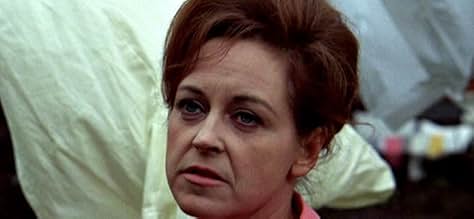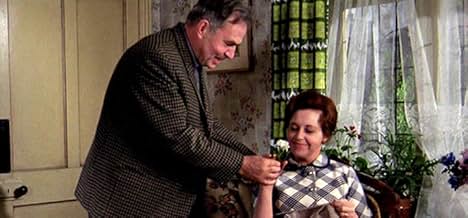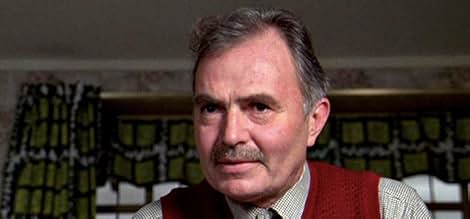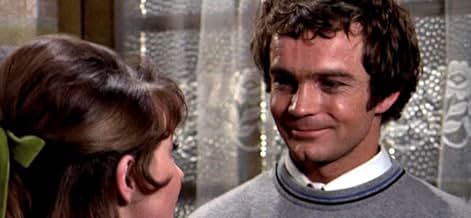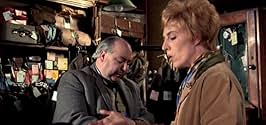CALIFICACIÓN DE IMDb
7.0/10
1.1 k
TU CALIFICACIÓN
Agrega una trama en tu idiomaA stern father and lenient mother try to deal with the ups and downs of their four children's lives in working-class Bolton.A stern father and lenient mother try to deal with the ups and downs of their four children's lives in working-class Bolton.A stern father and lenient mother try to deal with the ups and downs of their four children's lives in working-class Bolton.
Reginald Green
- Bowler 1
- (as Reg Green)
Opiniones destacadas
I have watched this film many times, and it always seems to get better. With great acting performance by James Mason, and the cast of this classic English film. If you have not seen it before, then I highly recommend that you do.
The golden age of the British "kitchen sink" film was the late fifties and early sixties, the age of "Look Back in Anger", "Woman in a Dressing Gown", "A Taste of Honey", "Saturday Night and Sunday Morning", "A Kind of Loving" and others. There were, however, a few excellent examples from the late sixties, such as "Alfie", "Kes" and "Spring and Port Wine". (I know that IMDb gives the date of this last as 1970, but in the closing credits of the film itself it is given as MCMLXIX, or 1969). . These latter three films were all in colour, whereas all the earlier examples cited were in black-and-white. Like "Alfie", "Spring and Port Wine" was based on a stage play by Bill Naughton.
The film is set in Bolton and concerns the working-class Crompton family, especially the patriarch, Rafe. Rafe, a factory worker, is a very conservative figure, not in the sense that he is politically right- wing- if anything, he inclines to the Left- but in the sense that he is traditional in his social attitudes. He is deeply religious and patriotic (he cannot understand people who go abroad for their holidays), and a lover of serious literature and classical music. Above all he takes a very old-fashioned view of family life; the father is head of the household and is owed unquestioning obedience from his wife and from his children, at least as long as they are living under his roof. Something of his attitudes can be gauged from the fact that he has named his four children Harold, Wilfred, Florence and Hilda, all names which would have been regarded as absurdly old-fashioned by most parents of Rafe's generation. (Some of those names, particularly Florence, have made something of a comeback since the sixties).
It must be said, however, that Rafe's attitudes are not always consistent- he claims to hate waste and extravagance, and makes his wife Daisy keep detailed housekeeping accounts, yet will happily spend forty guineas (two week's wages for the average working man at this period) on an expensive bespoke overcoat. (This coat will subsequently play an important role in the plot). Although he dislikes all manifestations of youth culture, especially pop music, and bemoans what he sees as the decline in morality in modern times, he seems unconcerned by the fact that his teenage daughter Hilda habitually wears a provocatively short mini-skirt.
The main theme of the film, a common one in the sixties, is the clash of values between old and young. An explanation of the rather enigmatic title is given in the original play, but this is omitted from the film; cinema audiences probably assumed that "Spring" referred to the rising young generation as contrasted with the "Autumn" of the old. (Hence the title of my review, borrowed from Gabriel Garcia Marquez). A crisis is provoked in the life of the Crompton family when Hilda, with the tacit support of her siblings, defies her father's authority by refusing to eat a herring for supper. Yet the Cromptons are not really a dysfunctional family. Although on the surface they do not demonstrate a good deal of love for one another, there are, beneath that surface, sufficient reserves of mutual respect and affection to help them cope with their difficulties. When a real crisis erupts in Hilda's life, she will find that her father is there for her.
The film's two internationally known stars are James Mason and Susan George, and both are excellent here. George's career was later to suffer from her being typecast as wild young sexpots, which made it difficult for her to get decent parts as she got older; she made few major films after 1980. It has, however, to be admitted that she could be very good in her limited range, and here as the rebellious young Hilda, a nonconformist in a deeply conformist household, she gives one of her best performances. (She was only nineteen at the time). Mason had the previous year in "Mayerling" played another autocratic father, albeit one from a very different social background, the Austrian Emperor Franz Josef. That had been one of his weaker films, but he is much better here as Rafe, the traditionalist trying hard to come to terms with the fact that the traditions he holds dear are no longer universally accepted. Other contributions of note come from Diana Coupland as Daisy, Hannah Gordon as Hilda's milder, more conciliatory older sister Florence, and Avril Elgar as Betsy-Jane Duckworth, the Cromptons' sluttish, slatternly neighbour.
The film was directed by Peter Hammond, better known as a television actor. It appears to be the only feature film he ever made as director, but it is an excellent one. Like many British films it has a strong sense of place, something deriving from extensive use of real Bolton scenes. As in many industrial Northern towns, the late sixties and early seventies were a period of extensive change in Bolton, a period when many historic buildings were being demolished to make way for modernistic, often ill thought-out, urban redevelopment schemes, and much of this transformation is clearly visible in the film. (Something similar can be seen in another British film from around the same time, "Get Carter" set in Newcastle). It seemed to me that Hammond was using these scenes as a visual metaphor for a similar transformation taking place at the heart of the Crompton family as the old inexorably gives way to the new. 8/10
The film is set in Bolton and concerns the working-class Crompton family, especially the patriarch, Rafe. Rafe, a factory worker, is a very conservative figure, not in the sense that he is politically right- wing- if anything, he inclines to the Left- but in the sense that he is traditional in his social attitudes. He is deeply religious and patriotic (he cannot understand people who go abroad for their holidays), and a lover of serious literature and classical music. Above all he takes a very old-fashioned view of family life; the father is head of the household and is owed unquestioning obedience from his wife and from his children, at least as long as they are living under his roof. Something of his attitudes can be gauged from the fact that he has named his four children Harold, Wilfred, Florence and Hilda, all names which would have been regarded as absurdly old-fashioned by most parents of Rafe's generation. (Some of those names, particularly Florence, have made something of a comeback since the sixties).
It must be said, however, that Rafe's attitudes are not always consistent- he claims to hate waste and extravagance, and makes his wife Daisy keep detailed housekeeping accounts, yet will happily spend forty guineas (two week's wages for the average working man at this period) on an expensive bespoke overcoat. (This coat will subsequently play an important role in the plot). Although he dislikes all manifestations of youth culture, especially pop music, and bemoans what he sees as the decline in morality in modern times, he seems unconcerned by the fact that his teenage daughter Hilda habitually wears a provocatively short mini-skirt.
The main theme of the film, a common one in the sixties, is the clash of values between old and young. An explanation of the rather enigmatic title is given in the original play, but this is omitted from the film; cinema audiences probably assumed that "Spring" referred to the rising young generation as contrasted with the "Autumn" of the old. (Hence the title of my review, borrowed from Gabriel Garcia Marquez). A crisis is provoked in the life of the Crompton family when Hilda, with the tacit support of her siblings, defies her father's authority by refusing to eat a herring for supper. Yet the Cromptons are not really a dysfunctional family. Although on the surface they do not demonstrate a good deal of love for one another, there are, beneath that surface, sufficient reserves of mutual respect and affection to help them cope with their difficulties. When a real crisis erupts in Hilda's life, she will find that her father is there for her.
The film's two internationally known stars are James Mason and Susan George, and both are excellent here. George's career was later to suffer from her being typecast as wild young sexpots, which made it difficult for her to get decent parts as she got older; she made few major films after 1980. It has, however, to be admitted that she could be very good in her limited range, and here as the rebellious young Hilda, a nonconformist in a deeply conformist household, she gives one of her best performances. (She was only nineteen at the time). Mason had the previous year in "Mayerling" played another autocratic father, albeit one from a very different social background, the Austrian Emperor Franz Josef. That had been one of his weaker films, but he is much better here as Rafe, the traditionalist trying hard to come to terms with the fact that the traditions he holds dear are no longer universally accepted. Other contributions of note come from Diana Coupland as Daisy, Hannah Gordon as Hilda's milder, more conciliatory older sister Florence, and Avril Elgar as Betsy-Jane Duckworth, the Cromptons' sluttish, slatternly neighbour.
The film was directed by Peter Hammond, better known as a television actor. It appears to be the only feature film he ever made as director, but it is an excellent one. Like many British films it has a strong sense of place, something deriving from extensive use of real Bolton scenes. As in many industrial Northern towns, the late sixties and early seventies were a period of extensive change in Bolton, a period when many historic buildings were being demolished to make way for modernistic, often ill thought-out, urban redevelopment schemes, and much of this transformation is clearly visible in the film. (Something similar can be seen in another British film from around the same time, "Get Carter" set in Newcastle). It seemed to me that Hammond was using these scenes as a visual metaphor for a similar transformation taking place at the heart of the Crompton family as the old inexorably gives way to the new. 8/10
I love this film 'Spring and port wine'. I was born in Leigh, a town about 7 miles away from Bolton, I moved to Bolton in 1965 when I was 20. My place of work was daily via Little Lever through Farnworth, sometimes on a bike but then by car when I could afford it.The film brings back all the memories of the working class neighbors who were almost always broke but who would always help you if they could. Fred Dibnah was round the corner from Bromwich St. were my bedsit was. If you didn't see the film when first released then you may be forgiven for comparing it to a soap such as Coronation St, well I agree it is a soap, but then, it was called 'Kitchen Sink Drama!' Watch this film for the talented cast who shortly afterwards became household names from frequent roles on TV, I watch mainly for the shots of the locality and the feel good factor of people being poor but happy!
Outside the household is a different world and the family struggle to tread the line between Dads authority and their hopes and dreams.
The period is captured; The bakelite light swithes, the Georgian floorpan, the picture rails, the wall paper, the short skirts, the cheeky lads, the Mini van, shiny modern mangles....
The location is captured; A wind lashed glacier hewn rocky landscape, walls of local stone, community, freedom.
But there is much much more; Childhood, happiness, sensuality, pride, values, freedom, authority, rebellion, violence (in the deepest sense), love, struggle, puberty, naivety, morality, trust, faith, deceit, machismo, manners, maturity, loss, poverty, sacrifice, horror, acceptence, revelation, comedy and parenthood are all there. (And in no particular order!).
This film is a richly woven expression of family tensions that are as relevent today as ever. The fact that some of these aren't tackled directly is testament in itself to the attitudes of the day but the fact that they are all here is a testament to the acting skill, the story and the direction.
If there's anything bad about this film, it's that all this deeply entrenched and wonderfully enacted tension is swept away a little too lightly towards the end. Maybe I missunderstand - the doom and gloom felt by many teenagers really does disappear if they deal with it (**) - maybe the film is trying to send even that message too - well worth doing.
What is the film trying to say? Kids: Parents were young too, parents struggle too, everyone makes mistakes, everyone learns, things change, struggle can end happily. Parents: Don't try too hard! Try to remember that your support is the key to their well being.
It sounds simplistic doesn't it? Sometimes the film feels like that too but it's then that you notice how much is being being challenged and uncovered.
The film is a classic.
(**) - Not the problems themsleves.
The period is captured; The bakelite light swithes, the Georgian floorpan, the picture rails, the wall paper, the short skirts, the cheeky lads, the Mini van, shiny modern mangles....
The location is captured; A wind lashed glacier hewn rocky landscape, walls of local stone, community, freedom.
But there is much much more; Childhood, happiness, sensuality, pride, values, freedom, authority, rebellion, violence (in the deepest sense), love, struggle, puberty, naivety, morality, trust, faith, deceit, machismo, manners, maturity, loss, poverty, sacrifice, horror, acceptence, revelation, comedy and parenthood are all there. (And in no particular order!).
This film is a richly woven expression of family tensions that are as relevent today as ever. The fact that some of these aren't tackled directly is testament in itself to the attitudes of the day but the fact that they are all here is a testament to the acting skill, the story and the direction.
If there's anything bad about this film, it's that all this deeply entrenched and wonderfully enacted tension is swept away a little too lightly towards the end. Maybe I missunderstand - the doom and gloom felt by many teenagers really does disappear if they deal with it (**) - maybe the film is trying to send even that message too - well worth doing.
What is the film trying to say? Kids: Parents were young too, parents struggle too, everyone makes mistakes, everyone learns, things change, struggle can end happily. Parents: Don't try too hard! Try to remember that your support is the key to their well being.
It sounds simplistic doesn't it? Sometimes the film feels like that too but it's then that you notice how much is being being challenged and uncovered.
The film is a classic.
(**) - Not the problems themsleves.
'Ee, it were right grim up north, especially if your dad was James Mason's Rafe Crompton, who the minute he enters the family home after putting in a shift at the local mill in Bolton, Lancashire, runs the roost with one hand on his wife's housekeeping money and the other on the Holy Bible. Diana Coup!and, later to play a similar part in a comedic manner opposite Sid James in the popular TV sitcom "Bless This House", is his adoring, but fearful wife who tries to keep the peace between father's draconian ways and their rebellious brood of four fast-growing children, all crammed under the one roof. He calls her "mother" and she calls him "father" which is enough to tell you the hierarchical rules of this particular household, but rebellion is in the air in the form of younger daughter Susan George, a free-spirit who duly picks her moment over a portion of herring put down before her at the family evening meal to at last revolt against the old man's outdated ways.
This sets off a chain reaction amongst the rest of the family as one by one they all, in their own ways, join in the revolution with old man Crompton standing his ground until the pressure finally tells on his wife at last forcing him to re-evaluate both himself and his draconian methods as head of the house.
While the ending is somewhat contrived and sentimental, betraying its origins as a stage play of the time, there's still much to enjoy here. The exterior shots of Bolton in the late 60's will strike a nostalgic chord with many of a certain age-group, to whom it will no doubt evoke memories of Dvorak's New World Symphony / Hovis advert, as well as recollections of the generation gap battles enacted here.
There are some frank dialogue exchanges, which while no doubt familiar in living rooms up and down the country are unlikely to have been heard much on the cinema screen.
Mason effects a fine Northerner's accent as the unyielding father figure while Coupland offers credible support as the recognisable "'er indoors", who with a mother's instinct, sees more than her husband and who gets caught in the crossfire. George is good too as the catalyst for change as are other recognisable faces from TV of the time, such as Rodney Bewes, Hannah Gordon and Frank Windsor.
As indicated, for dramatic purposes, I'd have probably preferred a darker ending but in the end my growing affection for the individual characters made me content with the "all's well that bloody ends well" conclusion presented instead.
This sets off a chain reaction amongst the rest of the family as one by one they all, in their own ways, join in the revolution with old man Crompton standing his ground until the pressure finally tells on his wife at last forcing him to re-evaluate both himself and his draconian methods as head of the house.
While the ending is somewhat contrived and sentimental, betraying its origins as a stage play of the time, there's still much to enjoy here. The exterior shots of Bolton in the late 60's will strike a nostalgic chord with many of a certain age-group, to whom it will no doubt evoke memories of Dvorak's New World Symphony / Hovis advert, as well as recollections of the generation gap battles enacted here.
There are some frank dialogue exchanges, which while no doubt familiar in living rooms up and down the country are unlikely to have been heard much on the cinema screen.
Mason effects a fine Northerner's accent as the unyielding father figure while Coupland offers credible support as the recognisable "'er indoors", who with a mother's instinct, sees more than her husband and who gets caught in the crossfire. George is good too as the catalyst for change as are other recognisable faces from TV of the time, such as Rodney Bewes, Hannah Gordon and Frank Windsor.
As indicated, for dramatic purposes, I'd have probably preferred a darker ending but in the end my growing affection for the individual characters made me content with the "all's well that bloody ends well" conclusion presented instead.
¿Sabías que…?
- TriviaWhen Arthur accidentally drives into the back of a car at the traffic lights (while kissing Florence), the driver of the car in front is the film's producer, Michael Medwin.
- ErroresThe first scenes are on a Friday evening after work. However, later when Rafe goes to play bowls, it is a bright, sunny day with the shadows suggesting it was shot around mid-day.
- Citas
Rafe Crompton: There's no father alive who doesn't long to escape his captivity every now and then...
- ConexionesEdited into Northern Soul (2014)
Selecciones populares
Inicia sesión para calificar y agrega a la lista de videos para obtener recomendaciones personalizadas
- How long is Spring and Port Wine?Con tecnología de Alexa
Detalles
- Fecha de lanzamiento
- País de origen
- Idioma
- También se conoce como
- Hering und Portwein
- Locaciones de filmación
- Sunnyside Mill, Bolton, Greater Manchester, Inglaterra, Reino Unido(was on Adelaide St., now demolished)
- Productora
- Ver más créditos de la compañía en IMDbPro
Taquilla
- Presupuesto
- GBP 198,000 (estimado)
- Tiempo de ejecución1 hora 41 minutos
- Mezcla de sonido
Contribuir a esta página
Sugiere una edición o agrega el contenido que falta

Principales brechas de datos
By what name was Spring and Port Wine (1970) officially released in Canada in English?
Responda

